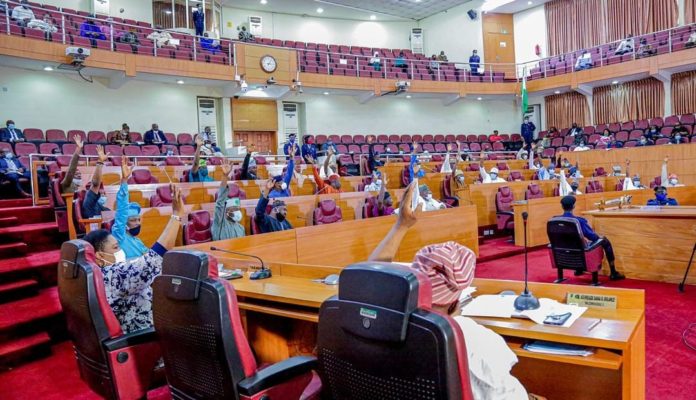Legislators in Lagos faced public outrage this past week after backing calls to regulate social media following the role it played in mobilizing and coordinating protests against police brutality.
Some legislators accused purported bad actors of hijacking the protests and spreading fake news to fuel unrest in Africa’s most populous city.
Actor turned legislator Desmond Elliot was an easy target and seemed to bear the brunt of criticism on social media.
He blamed the crisis that engulfed the nation’s commercial capital on the activities of social media influencers.
“Social media though good has its negative impact… Please celebrities, social media influencers, stop the hatred already,” Elliot said in a speech before the assembly on Tuesday.
When given the chance by local media two days later to clarify his utterances, an emotional Elliot said: “I can see why people thought it meant regulating the social media space. That was not in any way what I meant.”
“I could never have called for the social media space to be regulated,” said the legislator.
Elliot’s high profile status may have distracted from more forceful comments coming from other state and legislative actors against the protestors.
“The problems came from the social media,” another Lagos lawmaker, Adewale Temitope, said. “The need to regulate social media has become more than necessary. Our influencers must be brought to book.”
“There’s a way this social media can be controlled. You can’t just post anything in the United Arab Emirates, for instance. It’s being controlled by the government,” fellow legislator, Wahab Jimoh, insisted further.
It would surprise few observers that Nigeria’s Information Minister, Lai Mohammed, was also in full support of the regulation of social media.
Appearing before a committee in the House of Representatives on Tuesday, he did not mince words saying Nigeria ought to toe the line of China as far as regulating social media was concerned.
This has been a longstanding crusade for the minister.
“When we went to China, we could not get google, Facebook, and Instagram,” Mr. Mohammed said. “You could not even use your email in China because they made sure it is censored and well regulated.”
The minister is convinced regulation is needed to combat the threat of fake news.
“We are sitting on a time bomb on this issue of fake news. Unfortunately, we have no national policy on social media and we need one.”
There have been past reports that the Nigerian government has plans for a “Protection from Internet Falsehood & Manipulation” Bill, also known as the “Social Media” Bill.
Mohammed denied knowledge of such a Bill when he spoke to German broadcaster DW back in January 2020.
Activists like Sanyaolu Juwon, one of the leaders of the RevolutionNow campaign believe such a Bill to regulate social media exists and has vowed to resist it.
Juwon described the plan to regulate social media as “dead on arrival” when he spoke to Ubuntu Times.
“They have been planning this over the years and they have always introduced this Bill year in year out but every time, Nigerian people are mobilized against this draconian Bill.”
Underpinning the concerns over freedom of speech online was the hostility towards the #EndSARS protestors.
Various levels of Nigeria’s governance architecture remain reluctant to acknowledge the killing of unarmed protesters by security forces, most notably at the Lekki Plaza in Lagos.
At least 10 protesters were killed at the Lekki plaza on October 20, according to Amnesty International. That day has been christened Black Tuesday.
Nigeria President Muhammadu Buhari set the tone for this posturing during a national address when he did not acknowledge the widely-condemned use of force by the state.
Lagos Speaker Mudashiru Obasa was less subtle in his contempt for the protesters when called for a moment of silence in the House Assembly for “patriotic Lagosians” who lost their lives, “and not miscreants that were killed by Police.”

Some like lawmaker Mustainu Tobun refuse to believe any protestors were killed despite compelling evidence.
“Till today there’s no record of death. Till today we did not see any pictures,” he retorted during assembly proceedings.
One member of the House, Owolabi Ibrahim, did acknowledge the killings when he took the floor.
“We saw when the Police Force actively tried to reduce the number of our youth. I say that because they were shooting sporadically. We saw the videos. All of us saw it.”
The utterances from Lagos legislators are why the protest against police brutality morphed seamlessly into a stand against “impunity characterized by bad governance,” according to Juwon.
The activist was critical of Lagos Governor Jide Sanwo-Olu who he blamed for the violence he and other peaceful protesters faced at Lekki, among others.
“We were hunted down like mere animals,” he recalled, insisting that the governor must resign.
The violent crackdown notwithstanding, Juwon does not think the movement was crushed.
“The tragic events of Black Tuesday, the rising body counts and direct role of the police and military, has proven beyond reasonable doubt that the struggle against police brutality and extrajudicial killings is far from over and Nigerians no doubt will be returning to the barricades sooner than expected.”

